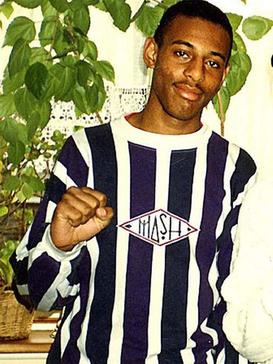Murder of Stephen Lawrence
| Date | 22 April 1993 |
|---|---|
| Location | Well Hall Road |
| Type | Murder |
| Stephen Lawrence | |
|---|---|

Stephen Lawrence
|
|
| Born | 13 September 1974 Greenwich District Hospital, London, England |
| Died | 22 April 1993 (aged 18) Well Hall Road, Eltham, South East London, England |
| Cause of death | Blood loss due to stab wounds |
| Resting place | Clarendon, Jamaica |
| Citizenship | British |
| Education | Blackheath Bluecoat Church of England School |
| Occupation | Student |
| Known for | Victim of racist murder |
| Parent(s) | Neville Lawrence Doreen Lawrence |
Stephen Lawrence (13 September 1974 – 22 April 1993) was a Black British man from Plumstead, south east London, who was murdered in a racially motivated attack while waiting for a bus on the evening of 22 April 1993. The case became a cause célèbre and one of the highest profile racial killings in UK history; its fallout included profound cultural changes to attitudes on racism and the police, and to the law and police practice, and the partial revocation of double jeopardy laws, before two of the perpetrators were convicted almost 20 years later in 2012.
After the initial investigation, five suspects were arrested but not convicted. It was suggested during the course of that investigation that the murder was racially motivated and that Lawrence was killed because he was black, and that the handling of the case by the police and Crown Prosecution Service was affected by issues of race. A public inquiry was held in 1998, headed by Sir William Macpherson, that examined the original Metropolitan Police Service (MPS) investigation and concluded that the force was institutionally racist. It also recommended that the double jeopardy rule should be abrogated in murder cases to allow a retrial upon new and compelling evidence; this became law in 2005 with the passage of the Criminal Justice Act 2003. The publication in 1999 of the resulting Macpherson Report has been called 'one of the most important moments in the modern history of criminal justice in Britain'.Jack Straw, Home Secretary from 1997 to 2001, commented in 2012 that ordering the inquiry was "the single most important decision I made as Home Secretary". In 2010 the case was described as being "one of the highest-profile unsolved racially-motivated murders".
...
Wikipedia
